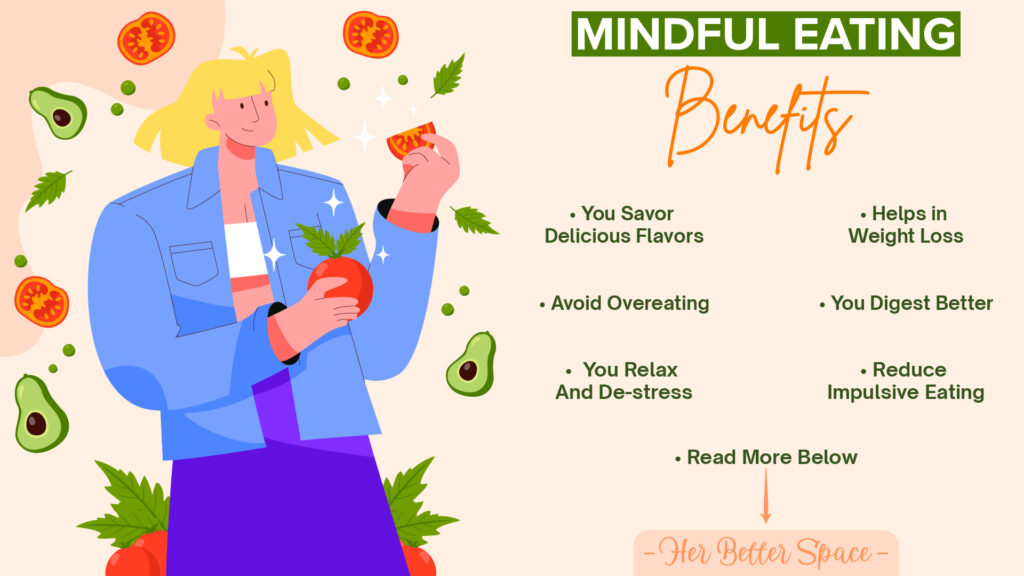Disclaimer: This post may contain affiliate links, meaning I will earn a small commission if you purchase through my link at no extra cost to you. For more information, check here.
Do you ever finish a meal and wonder, “What did I just eat?” or keep snacking at night while staring at your phone and feel guilty immediately?
I’ve been there too! It’s so easy to eat without thinking in our fast-paced world.
But what if I tell you there’s a simple mindset shift that can help you enjoy your food more, avoid overeating, and feel better? I’m talking about a way of eating called mindful eating.
By tuning in to your body and savoring each bite, mindful eating transforms your relationship with food. You gain awareness around why, what, and how much you eat.
In this article, I’ll share easy mindful eating habits and tips so you can reap the many benefits.
Should we start? Keep reading to learn how to be more present with your food through mindful eating. Let’s start this tasty journey together!
Mindful Eating Habits: Be Present With Your Food

What is Mindful Eating?
So, what exactly is mindful eating? Think of it as hitting the pause button before you eat.
Mindful eating means bringing complete awareness to the eating process, paying attention to flavors, textures, aromas, sounds, your body’s hunger signals, and even the emotions that show up around food.
It’s all about being fully present in the eating experience rather than mindlessly shoving food in your mouth.
Why Practice Mindful Eating?
Still wondering why should you give mindful eating a try? Let me share the 10 benefits of mindful eating.
- You savor delicious flavors instead of distantly chewing.
- It helps in weight loss.
- You gain control over cravings and portions.
- You choose nourishing foods that make your body feel good.
- You digest better when you slow down.
- You tap into hunger and fullness cues to avoid overeating.
- You reduce impulsive eating and bingeing when you pay attention.
- You relax and de-stress during meals by being present.
- You appreciate your food more and waste less.
- You extract more nutrients from the food by thoroughly chewing.
Convinced now? Mindful eating has so many rewards. Even just a few minutes a day can make a difference!
How to Practice Mindful Eating? (9 Incredibly Helpful Tips)
Create a Peaceful Eating Environment
Choose a quiet, comforting place to enjoy your meals, free of TV, phones, and other distractions.
Set the table nicely or use fancy dishes to make it a special experience. Light a candle, play soft music, and find a comfortable seat.
Creating a nurturing environment will set you up for a mindful meal.
Start With a Breathing Exercise
Before diving into your food, take a few moments to center yourself with some deep breaths
Close your eyes and notice the sensation of breathing. Inhale slowly through your nose, feeling your belly expand. Exhale gently through pursed lips. Repeat for a minute or two.
This breathing exercise brings you into the present moment so you can be more focused on the eating experience.
Take Small Bites and Chew Thoroughly
Avoid gobbling down large forkfuls of food. Instead, take small, manageable bites that allow you to chew thoroughly before swallowing.
Notice the burst of flavors and the texture of the food as you slowly chew. Bring an attitude of curiosity and appreciation to your food. Notice the aromas wafting from your plate. Enjoy the mouthfeel as you slowly chew.
When you take time to enjoy the sensory pleasures of eating actively, you gain satisfaction from smaller portions.
Chewing well aids digestion, keeps you from overeating, and lets you fully taste each morsel.
Go Slow – Rushing Creates Mindless Eating
It’s easy to eat quickly and mindlessly when you’re in a hurry. But speed eating prevents you from paying attention and enjoying your food.
Challenge yourself to slow way down, putting your utensil down between bites. Savor the textures and flavors in your mouth before reaching for the next bite.
Eating gently and slowly gives your brain time to process fullness signals and lets you focus attention on each morsel.
Check-in Periodically About Hunger Levels
Every few bites, pause to check in with yourself. How hungry are you feeling right now on a scale of 1-10? Has your hunger decreased since you started eating?
Only take another bite if you still feel truly hungry. These periodic check-ins keep you tuned in to your body’s satiety signals so you don’t overeat.
When Distracting Thoughts Arise, Refocus Your Attention on the Food
It’s normal for your mind to wander during a meal.
When thoughts about your to-do list or conversations start intruding, gently return your attention to the food. Notice flavors, textures, smells, colors, and how the food feels in your mouth and belly.
Bringing your focus back to the sensory experience of eating keeps you present.
Avoid Judgment of Flavors or Food Choices – Simply Notice Them
As thoughts arise while you eat, avoid attaching judgments such as “This food is too salty” or “I shouldn’t be eating this.” Instead, simply notice the thoughts and let them go. Return focus to your direct experience eating each bite.
Allowing flavors and feelings to just be what they are, without reacting, helps you become a neutral observer.
Pay Attention to How Your Body Feels Throughout the Meal
As you eat, notice how your body is feeling.
- Is your stomach getting full or satiated?
- Is the food providing a sense of satisfaction?
- Are you feeling energetic and nourished? Or sluggish and weighed down?
Checking in with your body provides valuable insight that can guide your food choices. Noticing how different foods physically make you feel helps you discern what your body needs.
End the Meal When You Start to Feel Full or Satisfied
Listen to your body’s cues to discern when you are full and no longer hungry.
Pause a few minutes after eating to check if your stomach feels comfortably satiated. As soon as you start to feel full, stop eating.
Pushing past fullness can lead to stomach discomfort and overeating. Ending a meal when you feel content, not overly stuffed, is a crucial aspect of mindful eating.
Over To You
I hope this beginner’s guide gave you some helpful pointers on how to eat more mindfully and develop mindful eating habits!
With a little practice, you’ll be surprised how this slight shift can transform your relationship with food. Soon, you’ll be able to listen to your body’s signals, enjoy every bite, and feel in control of your eating habits.
Give mindful eating a try for just one meal daily and see what changes.
Let me know in the comments what seemed most beneficial to you in the blog, or share your own mindful eating tips!
Now go relax and indulge in a delicious mindful meal – you deserve it!








